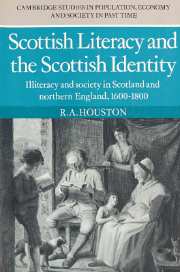 Scottish Literacy and the Scottish Identity
Scottish Literacy and the Scottish Identity Book contents
- Frontmatter
- Contents
- Tables
- Abbreviations
- Preface
- 1 The ideal of Scottish literacy
- 2 Structures and trends in illiteracy in the seventeenth and eighteenth centuries
- 3 Illiteracy in mid seventeenth-century Britain
- 4 The reasons for literacy
- 5 Measures of literacy
- 6 Oral culture and literate culture
- 7 The politics of literacy
- 8 Literacy and the Scottish identity
- Appendices
- 1 Sources for the study of Scottish and English literacy
- 2 Bookownership in the Highlands and Islands
- 3 List of active Scottish burghs, 1650–1750
- Bibligraphy
- Index
1 - Sources for the study of Scottish and English literacy
Published online by Cambridge University Press: 11 November 2009
- Frontmatter
- Contents
- Tables
- Abbreviations
- Preface
- 1 The ideal of Scottish literacy
- 2 Structures and trends in illiteracy in the seventeenth and eighteenth centuries
- 3 Illiteracy in mid seventeenth-century Britain
- 4 The reasons for literacy
- 5 Measures of literacy
- 6 Oral culture and literate culture
- 7 The politics of literacy
- 8 Literacy and the Scottish identity
- Appendices
- 1 Sources for the study of Scottish and English literacy
- 2 Bookownership in the Highlands and Islands
- 3 List of active Scottish burghs, 1650–1750
- Bibligraphy
- Index
Summary
There were many occasions when the people of early modern Europe were called upon to authenticate a document with their personal subscription. Taxation documents, land or moveable property transfers (wills, dowry contracts or charters for instance), and the systematic questioning of military conscripts and prisoners during the nineteenth and twentieth centuries provide immediate examples. Let us look in detail at one of these sources in order to assess the usefulness of alternative sources to the court depositions used in the main body of our analysis. When we have assessed their value we will be in a better position to specify the type of source which will be most useful for comparing levels of literacy in Scotland and England in the early modern period.
As a source for the study of literacy, wills have been described as 'fundamentally unsatisfactory. Local studies, such as Spufford's Contrasting communities on rural Cambridgeshire, have shown that they present a distorted and exaggerated picture of illiteracy. Other writers have gratefully eschewed wills as a source in favour of the much more tractable, representative and reliable church court depositions. In some countries, however, wills and deeds are the only available documents which provide information on literacy attainment, and a variety of techniques have been used to compensate for their acknowledged biases. Lockridge has argued for colonial New England that the acknowledged biases in wills – age and debility increase illiteracy while greater wealth and status of testators diminish it – cancel out, leaving signatures on wills a fair facsimile of signatures among the population.
- Type
- Chapter
- Information
- Scottish Literacy and the Scottish IdentityIlliteracy and Society in Scotland and Northern England, 1600–1800, pp. 267 - 296Publisher: Cambridge University PressPrint publication year: 1985
